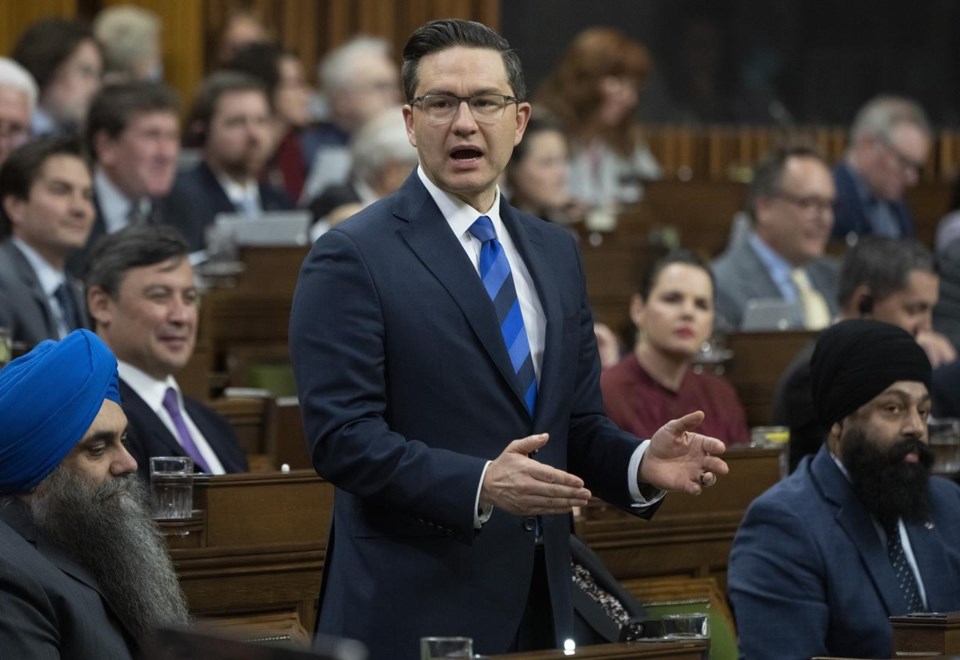OTTAWA — Pierre Poilievre said Wednesday he would honour the health-care increases Prime Minister Justin Trudeau has offered provinces if his Conservatives form the next government.Â
The Tory leader made the pledge a day after Trudeau proposed increasing health-care transfers by $17 billion above previous commitments, and providing another $25 billion via one-on-one deals with provinces over the next decade.
"We are going to honour it," Poilievre told reporters before a meeting with his caucus.Â
The Tory leader echoed criticisms from some premiers that the overall increase falls far short of what provincial and territorial leaders were hoping for, after years of complaints that Ottawa isn't paying its fair share of health-care costs.Â
He also argued that one of the reasons Trudeau did not offer premiers more money was that the extra funds weren't available due to the Liberal government's spending. But he did not say how much he might be willing to offer.
"I can't commit to a dollar figure until I've seen how badly Trudeau has ruined the federal finances," Poilievre said.Â
The Conservative leader had been tight-lipped until Wednesday about where his party stood on the issue of health-care spending. Leading up to the unveiling of the deal, Poilievre and other MPs wouldn't say whether they shared premiers' belief that more federal spending was needed to fix health care — or whether the party was willing to meet their demands. Poilievre's silence prompted attacks from the federal New Democrats.
On Wednesday, Trudeau charged that Conservatives "have come out to slam our investments in health care," saying it is a party that believes in "cuts" and "austerity."Â
But Poilievre told reporters that he believes in protecting the health-care system, and when it comes to cuts, he would usher in a so-called pay-as-you-go law. For every new dollar spent, he would force his government to find "savings."Â
He touted that under the former Conservative government of Stephen Harper — which he served in until it lost power to Trudeau in 2015 — health transfers to provinces were increased annually by six per cent.Â
The deal he was referring to had been negotiated by the previous Liberal government of Paul Martin.Â
Harper's government decided to reduce the annual increase in health transfers to a minimum of three per cent, or more according to economic growth, beginning in the 2016-2017 financial year. Trudeau's Liberals decided to continue with that approach.
This week, Trudeau invited all 13 provincial and territorial leaders to Ottawa to present an offer that would see transfers to the provinces rise by a combined $196 billion over the next 10 years.
Despite their stated disappointment, many premiers have signalled a willingness to accept the offer, with Trudeau saying he wants to begin negotiations on individual deals.Â
Under those deals, premiers would have to agree to conditions that Trudeau says would ensure the funding boost result ins improvements to four federally stated priority areas: data collection, mental health, staffing and the availability of family health services.Â
Premiers have bristled about the federal government telling other jurisdictions how the money will be spent, and it became a sticking point in the lead-up to negotiations.Â
Asked whether Poilievre believes in attaching strings to federal health spending, he said he believes in having "shared goals" with provinces, such as efforts to speed up foreign credential recognition for immigrants — something Trudeau said Tuesday he wants to fix.Â
"Shared goals. I like the term 'shared goals,'" Poilievre said.
With Canada's premiers descending on Ottawa for several days, he said he met with Saskatchewan Premier Scott Moe and Alberta Premier Danielle Smith to discuss matters such as support for the energy sector and opposition to the federal consumer carbon price.Â
Before Wednesday's caucus meeting, Smith also met with approximately 20 of the party's MPs from Alberta for a breakfast meeting in the office of longtime Calgary MP Michelle Rempel Garner.Â
"All Alberta MPs were invited," Rebecca Polak, Smith's press secretary, wrote in an email to The Canadian Press. She added that the office was "thankful for those who could attend."
Len Webber, the chair of the federal party's Alberta caucus, said that Smith enjoys an "open invitation" to meet with its members.Â
"We were pleased to be able to meet with our premier when she was in Ottawa. This is not the first time the Alberta caucus has met with a premier of the province. We had a productive discussion and appreciated the opportunity," he said in a statement.
"Our informal meeting this morning allowed us to share information on our discussions while respecting the usual caucus confidentiality afforded all participants in a formal meeting."
This report by The Canadian Press was first published Feb. 8, 2023.
Stephanie Taylor, The Canadian Press



